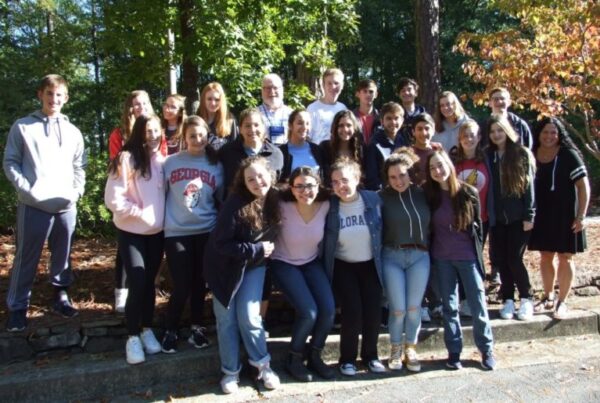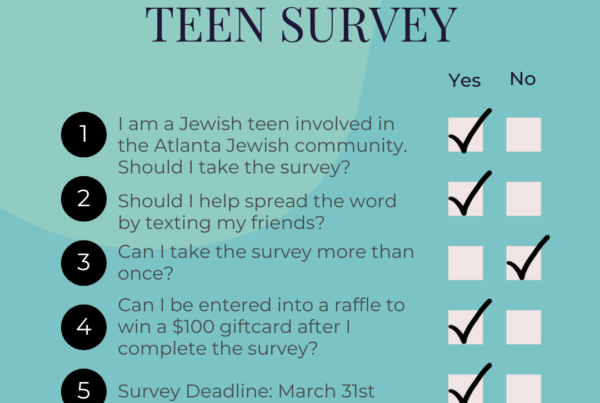First published by the Atlanta Jewish Times ›
Writing about the Jewish Federation of Greater Atlanta inspires metaphors.
Certainly, the Federation is the hub of a philanthropic wheel, its spokes representing the money it raises and distributes, the programs that connect elements of a far-flung Jewish community, and the links it fosters with Jewish and non-Jewish groups.
Think of JFGA, founded in 1905 as the Atlanta Federation of Jewish Charities, as an analog device retooled for the digital world.
Three years ago, shortly before Eric Robbins was hired as its president and CEO, the Federation was described in this space as “an aircraft carrier, an enormous craft that requires time to pivot in the water.”
After three years at the helm, Robbins feels that the pivot is underway. “I think we have a very clear direction. I think we have the right talent, both volunteer and professional, on board to get us there. And we have some momentum,” he said during an interview at Federation headquarters in midtown Atlanta.
Philanthropy involves channeling money into good works, so any discussion of the Federation, which is a 501(c)(3) non-profit under the federal tax code, starts with money raised to meet three priorities labeled as: Ensuring a Jewish future, Caring for Jews in need, and Strengthening Jewish community.
For fiscal year 2019, which ended June 30, donations to the Federation totaled more than $19 million, an increase from $17.5 million in fiscal 2018. There were 300 first-timers among 3,559 donors, and 8 percent of donors gave more than $10,000.
In late July, the Federation will announce how about two-thirds of the money raised in fiscal 2019 will be allocated in fiscal 2020, which began July 1. About 65 percent will go to organizations in Atlanta and the United States with the other 35 percent designated to connect with Jews globally, including in Israel and in the former Soviet Union.
A portion of the money allocated for Israel remains in Atlanta to fund the shinshinim, young Israelis who have graduated high school but not yet begun military service. They come to Atlanta to share their knowledge and love of their homeland at synagogues, day schools, and other programs in the Jewish community.
If the general allocations are “old school,” analog Federation, the Innovation Fund is the new, digital world. Several times a year that fund, increased this year to $440,000, awards grants to support new and emerging efforts to enhance Jewish life in Atlanta.
A third funding vehicle selects a set of recipients for what it calls targeted philanthropy. This past year funding was earmarked for PJ Library, a program providing books for Jewish families; overnight camping scholarships; JumpSpark, a teen programming initiative; and Repair the World, which provides service opportunities.
“We don’t just exist to fundraise for the community. If that’s all there is you could argue there is no relevance for us,” Robbins said. “But who is planning for the future of the Jewish community? Who is bringing the community together? Who is handling security on a community-wide perspective? Who is helping to build relationships with the non-Jewish community?”
After several more questions, Robbins ended with, “Who is beginning to think about what this community has to look like, not only tomorrow, but what it should look like in 25 or 30 or 50 years?”
According to the Federation’s fiscal 2018 tax filing, the most recent available, Robbins was paid $394,641. The staff he oversees has 58 full-time and 12 part-time employees.
“I think Eric has done a good job of creating priorities and bringing people together around a shared and common vision,” said Dov Wilker, Atlanta regional director of the American Jewish Committee. “He has done the best job of any Federation CEO in recent memory of being the convener in the community,” Wilker said, mentioning as an example the trip to Israel several months ago by 70 religious and lay leaders.
“It’s a sacred moment to be in this role at this time,” Robbins said at the start of his remarks to the Federation’s recent annual meeting in June, held in the gymnasium of the MJCCA.
Asked a couple of weeks later, Robbins said that by “sacred” he meant the opportunity to build and sustain the Jewish future. “I’m not sure that there’s ever not been a sacred time, but I certainly think now is a sacred time,” he said.
A year earlier, Robbins told the 2018 annual meeting audience that two things kept him awake at night: apathy and relevance – issues that remain in 2019.
“I still worry about apathy, because I think that’s the biggest threat to Jewish life. People don’t want to buy in. I will tell you that we had a little bit of a wake-up call in Pittsburgh and in Poway, and I don’t want that to be the wake-up call, and that has me not sleeping for other reasons,” Robbins said. He grew up in the Squirrel Hill neighborhood of Pittsburgh, home to the Tree of Life synagogue, where 11 worshippers were massacred on Oct. 27, 2018, by a gunman spewing anti-Jewish venom. “For a moment there, people said, oh, maybe Judaism is important and we need to protect it, but it’s a shame that that’s what it takes. That is the significant difference between ’18 and ’19.”
How the community is secured will change this summer.
Cathal Lucy, the Secret Service veteran who has been director of community-wide security for the Atlanta Federation since Oct. 2015, is stepping down in July. He will be succeeded by his deputy, Zach Williams, who joined JFGA several months ago from the Georgia Emergency Management Agency. [The decision was Lucy’s, Robbins said. Lucy did not respond to queries from the AJT.]
Robbins said that the Federation will increase its engagement with the Secure Community Network, maintained by the Jewish Federations of North America, which provides Jewish institutions with security updates and can provide personnel to assist local federations.
If securing Jewish institutions has become a priority for Federations nationwide, that to-do list also includes connecting millennials (born 1981-1996) to the Jewish community at-large, never mind seeking a donation. Studies conducted in recent years have found that a significant percentage in this age group have little or no attachment to their Judaism.
In the 2013 Pew Research Center study of American Jews, 68 percent of millennial Jews identified as “Jews by religion” while 32 percent were classified as “Jews of no religion.” A 2017 report by the Public Religion Research Institute found that about one-third of Americans who identify as Jewish were “cultural Jews,” with no religious attachment. PRRI also reported that 53 percent of those under age 30 qualified as “cultural Jews.”
Among the Federation’s efforts to connect this younger cohort with the wider Jewish community have been its support of “Next Gen” involvement with Birthright Israel, convening “The Interchange” forum to explore how the Jewish community can be more welcoming toward interfaith families, and through a program pairing younger social and business entrepreneurs with community elders for mentoring and intergenerational learning.
Renee Kutner, the Federation’s vice president of marketing, said that success will not be measured by whether young adults come to the Federation annual meeting, but whether it is “coming to them at the places where they want to be.”
Where they want to be are sections of Atlanta where the Jewish community is growing. The northern reaches of the metro area, a broad swath that includes Alpharetta and Johns Creek, will be the first focus of a five-year grant the Federation has received to target neighborhoods. That effort will supplement the “PJ connectors,” people working part-time for the Federation creating Jewish programming in Smyrna, Brookhaven, Dunwoody, Decatur and the North Metro area.
“None of this is about connecting to Federation. Federation exists to build the community … We want to connect people to the community in hopes that they’ll support the community through Federation,” Robbins said.
Among other plans on the drawing board for 2020 and beyond, Robbins said, “We’re moving forward on ideas to help support part-time and day school education in the community, and on the concept of a family camp. We have a vision of a camp that operates year-round for families. We would prototype it, lease a site somewhere and try it.”
A goal Robbins had when he arrived 2016, of gathering numerous Jewish organizations under one roof, may be realized in a proposed renovation of the Federation’s three-acre headquarters at 18th and Spring streets.
When Robbins addressed the 2019 annual meeting, a sketch – now dubbed “the Jetsons building,” a nod to the early 1960s television cartoon – briefly appeared on a screen behind him.
In an AJT interview, Robbins and Kutner stressed that the drawing was not “the” building, but rather one architect’s idea. “That is the current rendering of what we are exploring having in this space, which is a multi-use building for Atlanta’s Jewish community,” Robbins said. A feasibility study may begin in the months ahead, followed by preparations for a fundraising campaign, though no cost figure has been attached yet to the project.
In addition to Federation’s headquarters, a new building could house workspace for smaller and emerging Jewish organizations, offices or satellite space for more established agencies, expanded space for the William Breman Jewish Heritage Museum, a small theater (for possible use by the Atlanta Jewish Film Festival), an Israel experience center and, atop all of these, residential properties.
“We believe that the greatest way to create energy in the Jewish community is that collision of organizations, and we’re going to create that capsule,” Robbins said. “The concept embodies exactly what we want to be in the community. This is not Federation’s building, don’t call it Federation’s building. This is a building that would be the home to many Jewish organizations and programs.”
The Federation is also part of Atlanta’s broader philanthropic landscape. Alicia Philipp, executive director of the Community Foundation for Greater Atlanta, said, “We have partnered with the Federation for years on various programs and events, and Eric has continued that commitment during his tenure. The Federation has deep roots in the Atlanta community and a strong history of being collaborative and thoughtful in their work with us at the Community Foundation and with other organizations working to addressing the needs of our communities.”
Toward the end of the hour-long interview, Robbins said, “I’m more convinced than ever in the importance of Federation, in building and sustaining this community.”





